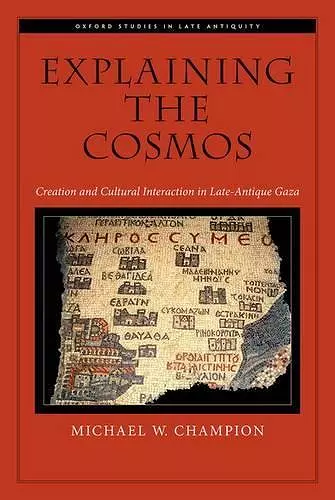Explaining the Cosmos
Creation and Cultural Interaction in Late-Antique Gaza
Format:Hardback
Publisher:Oxford University Press Inc
Published:30th Jan '14
Currently unavailable, and unfortunately no date known when it will be back

Explaining the Cosmos analyzes the writings of three thinkers associated with Gaza: Aeneas, Zacharias and Procopius. Together, they offer a case study for the appropriation, adaptation, and transformation of classical philosophy in late antiquity, and for cultural transitions more generally in Gaza. Aeneas claimed that the "Academy and Lyceum" had been transferred to Gaza. This book asks what the cultural and intellectual characteristics of the Gazan "Academies" were, and how members of the schools mixed with local cultures of Christians, philosophers, rhetoricians and monks from the local monasteries. Aeneas, Zacharias and Procopius each contributed to debates about the creation and eternity of the world, which ran from the Neoplatonist Proclus into the sixth-century disputes between Philoponus, Simplicius and Cosmas Indicopleustes. The Gazan contribution is significant in its own right, highlighting distinctive aspects of late-antique Christianity, and it throws the later philosophical debates into sharper relief. Focusing on the creation debates also allows for exploration of the local cultures that constituted Gazan society in the late-fifth and early-sixth centuries. Explaining the Cosmos further explores cultural dynamics in the Gazan schools and monasteries and the wider cultural history of the city. The Gazans adapt and transform aspects of Classical and Neoplatonic culture while rejecting Neoplatonic religious claims. The study also analyses the Gazans' intellectual contributions in the context of Neoplatonism and early Christianity. The Gaza which emerges from this study is a set of cultures in transition, mutually constituting and transforming each other through a fugal pattern of exchange, adaptation, conflict and collaboration.
Champion has written an orderly and readable book about a major subject and an interesting 'location' which nowadays attracts the specialists of Late Antiquity for its complex cultural visage. He undoubtedly displays a good ability for synthesis, especially in the second part of his work, by summarizing and positively exploiting previous research. * Lorenzo Perrone, Aestimatio: Critical Reviews in the History of Science *
Serves as an excellent case study for the intellectual history of the eastern Mediterranean in the late-fifth and early-sixth centuries. The clarity with which Champion teases apart strands of Neoplatonic and Christian thought will prove highly useful to students and scholars of late-antique philosophy, religion and intellectual history. * Bryn Mawr Classical Review *
ISBN: 9780199337484
Dimensions: 239mm x 165mm x 31mm
Weight: 476g
256 pages